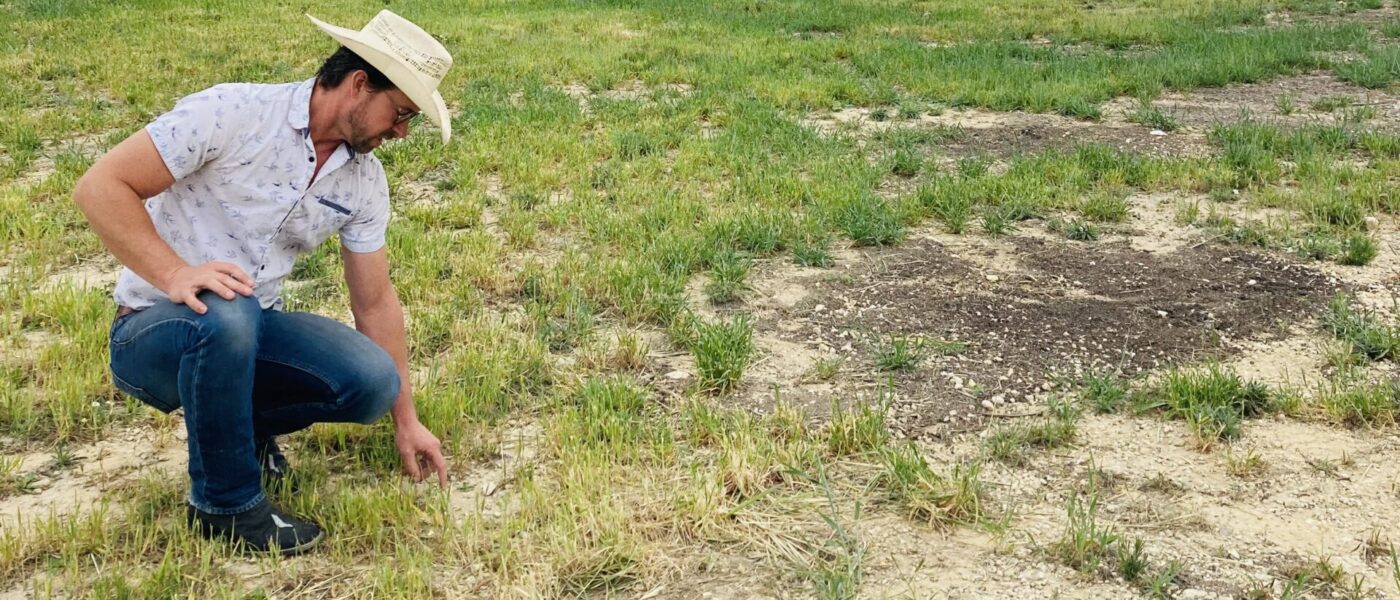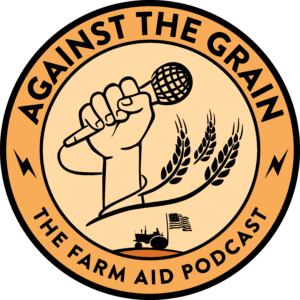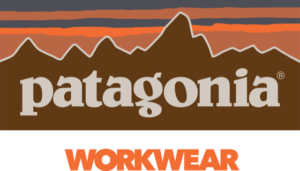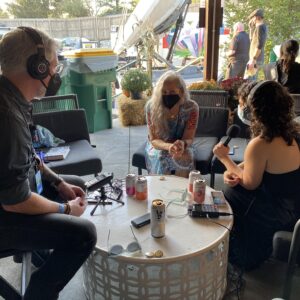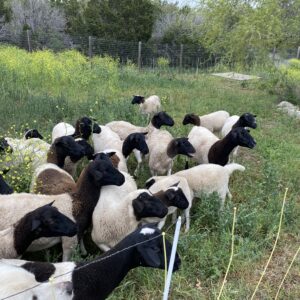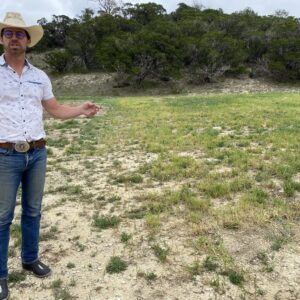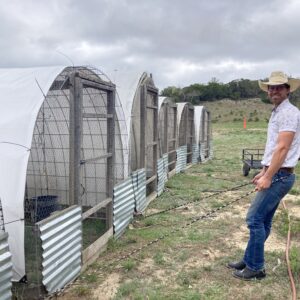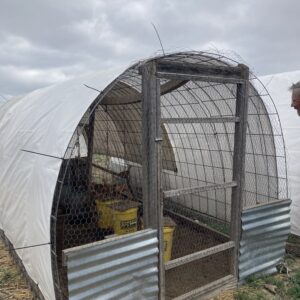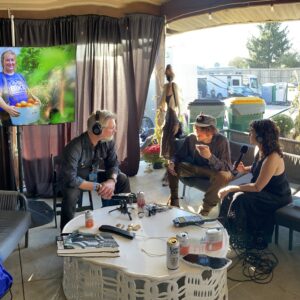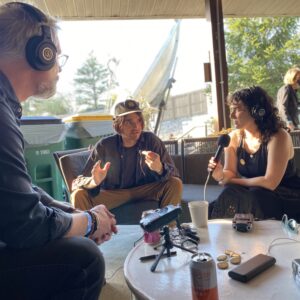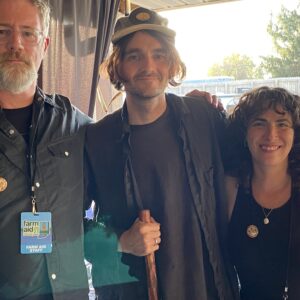As Farm Aid artist Micah Nelson says, “the soil is the most fundamental source of life.” When Micah and his family were riding out the pandemic at their ranch in Luck, Texas, they decided to start growing their own food. But as anyone who lives in Texas Hill Country can tell you, it is rough, rugged terrain, frequently distinguished by densely packed, seemingly inhospitable earth. Fortunately, Micah’s mother, Farm Aid board member Annie Nelson, encountered Tina and Orion Weldon at the farmers market they launched in Spicewood, TX, and invited them to collaborate. In this episode of Against the Grain, we hear the story of how the Nelsons and the Weldons joined forces to regenerate and rejuvenate that Texas soil. Using the principles of regenerative agriculture they’re bringing back grassland species, which are the foundation of a healthy, vibrant food economy. This form of farming is a viable alternative to the prevailing system of industrial agriculture. Learn why this is and how you can take action by demanding that your Congressional representatives include support for climate-friendly farming in the upcoming Farm Bill.
Listen to episode four below. And, make sure to subscribe in your podcast app of choice!
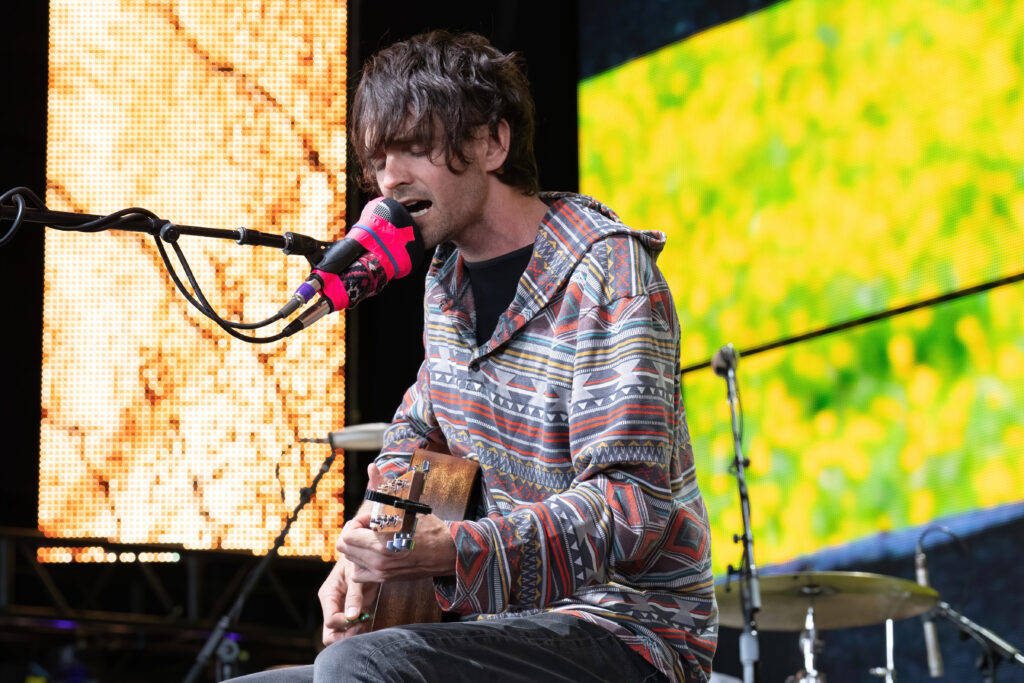
Micah Nelson (Particle Kid) at Farm Aid 2022. Photo: Suzanne Cordeiro
Micah Nelson
Micah Nelson comes from a lineage of musical and cultural pioneers. Growing up touring with his father Willie Nelson and his brother Lukas Nelson, he has always been surrounded with vibrant and authentic creative spirits. Both a talented, visionary artist and iconoclastic musician, he is a painter, guitarist and leader of his own band called Particle Kid, and frequently plays with his father on tour and every year at Farm Aid. Most recently, Neil Young tapped Micah to follow in the footsteps of Danny Whitten and Frank Sampedro by playing guitar in Crazy Horse.
On his latest Particle Kid project, Time Capsule, Micah pulls listeners down the rabbit hole to experience the unreleased music he’s been making over the past decade. Time Capsule, takes listeners on a nearly two-hour trip through various genres, ideas and sounds; an eclectic palette of sonic colors, both familiar and exploratory feelings, painted together like a collage — as if 90s alt, 60s psych, 70s electric jazz, and some abstract future were all magazines chopped up and glued together by Micah’s voice and lyrics. The album also features guest spots from J Mascis (of Dinosaur Jr), Margo Price, Jim James, Sunny War, and Sean Ono Lennon, among others.
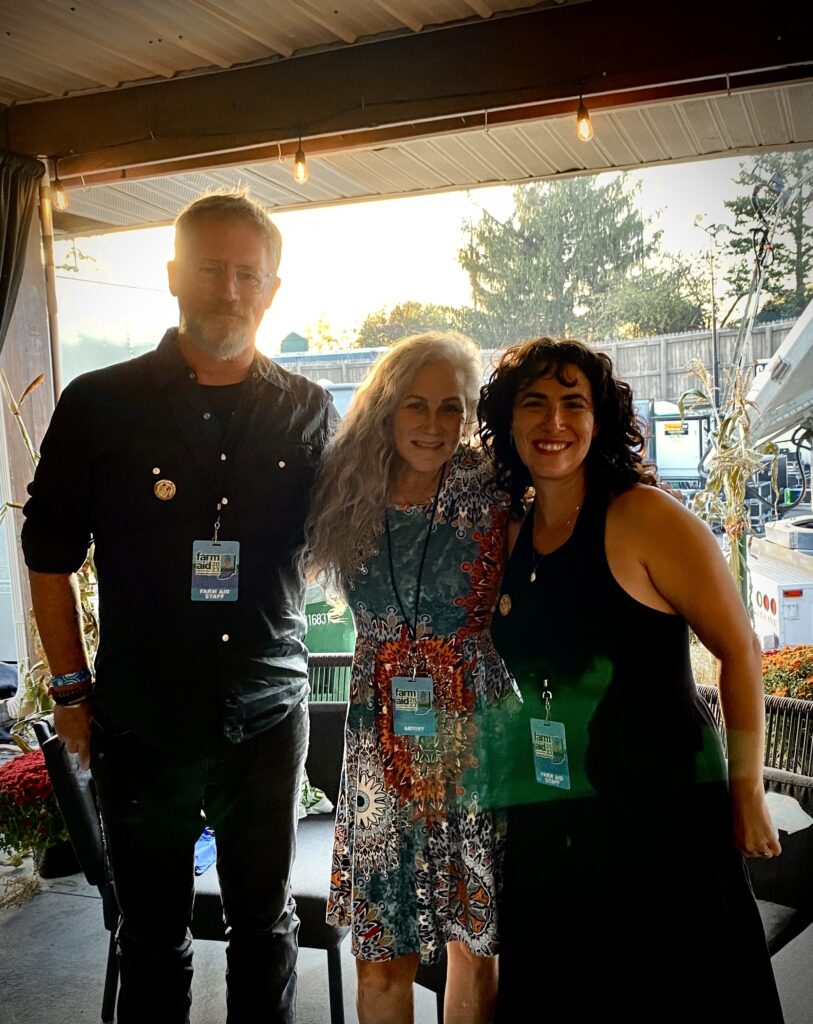
Annie Nelson (middle)
Annie Nelson
Annie Nelson — who met husband Willie Nelson shortly after the first Farm Aid concert in 1985 — has served an integral role in the annual Farm Aid music and food festival. She has worked for decades to stand up for family farm agriculture and create opportunities for local, independent farmers, and she is an activist on many issues that positively impact America’s family farmers.
In 2021, Annie, along with Margo Price, joined the Farm Aid Board of Directors. “I am honored to join Willie and the other members on Farm Aid’s Board of Directors,” said Nelson at the time. “I’ve witnessed the incredible strength and resilience of America’s family farmers through my involvement in Farm Aid, and I am eager to continue to help our family farm system thrive through this new role.” She remains one of Farm Aid’s most steadfast champions.
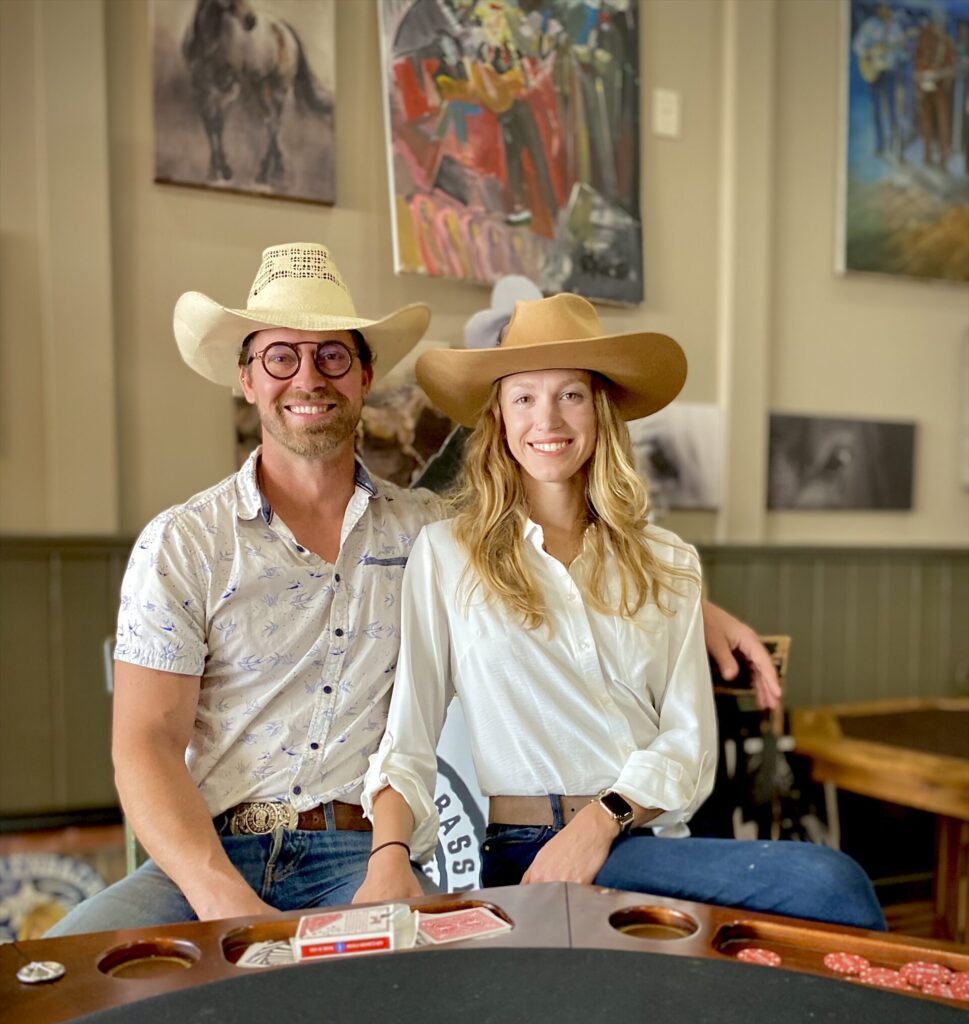
Tina and Orion Weldon
Tina and Orion Weldon
Tina and Orion Weldon founded TerraPurezza in 2015 in Spicewood Texas. Tina has a lifelong passion for nourishing community health through deep nutrition and vibrant living. She has a degree in dietetics from Ruthers University, where she met Orion, whose academic background is in conservation ecology and ornithology. In fact, the two met at the 350.org climate protest in Manhattan and soon discovered that each had been thinking about putting their training to work by starting a regenerative agriculture farm. “I secretly started a RegenAg farm to save grassland breeding birds,” Orion quips, but nearly ten years later they have done so much more than that.
By moving back to a family homestead, they put their regenerative dreams to the most challenging test of trying to transform densely packed Texas Hill Country terrain into thriving, healthy, living soil. By combining traditional agricultural techniques such as rotational grazing and cover cropping with modern technology systems, they have rejuvenated more than 100 acres of land, with 200 more acres in progress. That regenerated soil provides a more vibrant foundation for the growth of native plants and nutritionally-dense food.
TerraPurezza is a real-world example of how different regenerative agricultural techniques not only work but can succeed at any scale. In the future, Tina and Orion plan to establish a regenerative agriculture institute to which other farmers can come to learn and collaborate in transforming their own regional farm and food systems.
Not only have Tina and Orion built a regenerative agriculture farm from scratch, but they also co-founded the local farmer’s market, and partner with the Nelson family to regenerate Luck Ranch. They’re also raising two boys on their ranch and find time for dancing, sailing, rollerskating and more. Tina is also an avid equestrian and says she’s looking forward to raising an adventurous, globally-minded family with deep roots in restored Texas soil.
Take Action!
The Inflation Reduction Act of 2022 (IRA) included a historic investment in addressing agriculture’s role in mitigating climate change, but these gains are now under threat. The IRA allocated $18 billion to support climate-friendly farming and forestry practices. This funding represents an important step in increasing the climate resilience of America’s farms and must be protected. Right now, Congress is deciding how much money will be given to different agriculture programs within the next Farm Bill. Instead of increasing agricultural spending, some Republicans in Congress want to reallocate IRA funds from conservation programs to commodity crop safety-net programs. This shift would directly contradict what this funding is intended to do: Rather than supporting climate change mitigation measures, IRA money would subsidize environmentally harmful agriculture practices. Unlike conservation programs, which serve a diverse range of farmers, commodity support programs serve fewer, larger operations. By reallocating funding from these programs, Congress further restricts the ability of farmers to be part of the solution to the climate crisis.
Tell your representatives: protect IRA funding and keep it in Title 2!
Watch Videos Featured in this Episode
Particle Kid performs “Even the Birds” at Farm Aid 2023 in Noblesville, Indiana, at Ruoff Music Center, on September 23.
Willie Nelson and the Boys perform “Thought About You Lord” virtually at Farm Aid 2020 On the Road on September 26.
Learn more about regenerative agriculture from Tina and Orion Weldon on their YouTube Channel
Watch Dr. Rattan Lal, professor of soil science and founder and director of the Carbon Management and Sequestration Center at The Ohio State University explain why soil is so important.
AGAINST THE GRAIN EPISODE 4: It’s Not the Cow, It’s the How
FOLEY: Special thanks to our founding partner Patagonia Workwear: Built for folks who bust ass on the daily to leave our home planet better than they found it.
FOLEY: Welcome to Against the Grain, the Farm Aid podcast. I’m Michael Stewart Foley.
KURN: And I’m Jessica Ilyse Kurn. Today we’re dipping our toes into the topic of climate change and agriculture, and it’s a large topic. There are many angles we could take. For one, we could explore the ways that our changing climate is having grave impacts on farms and crops. That’s events like droughts or, on the flip side, floods. Or we could explore how the agriculture sector has negatively impacted our environment: everything from overdraw water, from aquifers, spraying chemicals on the land and the sector’s emissions of greenhouse gasses.
FOLEY: Right, But today, we’re thinking mostly about the ways that farmers can positively impact our environment, and to narrow that down even further, we’re exploring regenerative agriculture, specifically regarding ranching. This is in complete contrast to the type of industrial agriculture like CAFOs that we covered in episode two of this podcast.
KURN: Yeah, that’s right. Regenerative agriculture looks very different. It’s a relatively new term that’s starting to catch on. And not to date myself, but I actually remember it when spell check would underline the word “sustainability”, and look at us now. It seems to be a word firmly embedded into our lingo.
FOLEY: Yeah. Ok. Don’t talk to me about dating yourself, Jess, you youngster. Right,regenerative agriculture speaks to farming and grazing practices to keep our environment healthy. Things like composting and practices like cover cropping and no till farming are just some of the regenerative practices that rebuild organic matter in the soil. These positive steps are in contrast to the prevailing industrial system of agriculture that has devastated our landscape.
KURN: And each of these mechanisms makes us both more resilient to climate change on the one hand and helps us to mitigate climate change on the other. And you can’t really talk about regenerative farming and ranching without starting at the ground level with the soil. In this episode, we’ll learn how healthy soils actually draw carbon from the atmosphere to trap it or sequester it in the soil, in turn, helping our environment.
KURN: I think the soil is a great place to start, and to focus this episode, we have the perfect guest to kick us off: Farm Aid artist Micah Nelson knows a lot more than most people about regenerative agriculture and told us backstage in September at Farm Aid 2023 that soil is the backbone of a healthy food system. He expressed how, to him, sustainability and the health of our planet supersede politics.
MICAH NELSON: I mean, it’s just about being a person on a planet and deciding whether you’re interested in supporting life or not. Because life is, it’s a delicate dance on a planet with a delicate ecosystem. You know, the soil is the most fundamental source of life. And, you know, it’s so much deeper than politics. It’s so much more cosmic than that, more existential than that.
KURN: If you’ve been listening to this podcast, you probably know who Micah Nelson is. Not only is he the composer and performer of Against the Grain’s theme music, but he’s an artist of varied talent: a painter, a songwriter, guitarist, leader of his own band named Particle Kid, and also, in fact, right now, he is out on the road as the newest member of Neil Young’s band, Crazy Horse.
FOLEY: Yeah. And beyond that, as you just heard, Micah is a very knowledgeable student of regenerative agriculture.
MICAH NELSON: It’s not just about sustainability but regenerative practices that you’re actually regenerating and you’re healing the damage that’s been done. You’re providing that opportunity for the next seven generations. But no matter where you are soil is king. As long as you figure out how to get your soil healthy and happy and thriving, then then you can kind of do anything or at least you can do a lot more than you would have otherwise,
KURN: Here’s Micah expressing those same sentiments before his Farm Aid 2023 performance as Particle kid.
MICAH NELSON: Well, it’s pretty simple: The soil is the foundation of life, and the farmers protect the soil. So we got to protect the farmers and we can protect the farmers by supporting the farmers by voting with our dollar every day we buy food. It’s not rocket surgery (laughs). [Performing “Even the Birds”]
FOLEY: That was Micah performing “Even the Birds” as Particle Kid at the last Farm Aid Festival. When Micah and his family, including his dad, Farm Aid President Willie Nelson, and his mom, Annie, who’s also a Farm Aid board member, and his wife, Alex and his brother Lukas were riding out the pandemic at the family ranch in Luck, Texas, just outside of Austin, he got the idea that they should start growing their own food.
KURN: He started learning more about healthy soil and why it may just be one of the golden tickets that farmers have in disrupting this wrecking ball that is climate change.
FOLEY: That’s when his family met Tina and Orion Weldon of TerraPurezza Farm. At the time, they were relatively new farmers who had academic backgrounds in nutrition -that’s Tina- and conservation ecology, in the case of Orion.
KURN: It all started when Micah’s mom, Annie Nelson, took interest in the couple at her local farmer’s market
ANNIE NELSON: They’re both Rutgers grads in ag, and then he didn’t like the industrial ag part and just decided to start learning about and exploring regenerative farming and going that direction. And I had watched them for a while at our farmers market, our local farmers market, and I invited them to come take a look at the ranch and see if we were a mix and we were. And they’ve been there through now, their second child. And, uh, yeah, they’re part of the fam.
KURN: Stick around to join us at their farm
FOLEY: And just a quick word to say thanks to our founding sponsor, Patagonia Workwear: Built for the ones who don’t wait around. The ones who prove that it’s possible to make a good living on a living planet.
FOLEY: The ranch is a magical, beautiful hill country setting. We set the scene a little bit in our bonus episode that featured Chef Rick Bayless who we met at the Luck Reunion Festival last month, and you can go check that out if you haven’t already. That bonus episode is up on our website.
KURN: Yeah, that’s right. It was a pretty amazing place with hundreds of acres, mostly hilly, uncleared land, dotted with oaks, and there were Texas blue bonnets everywhere. When Tina and Orion first got to the ranch, they noticed that much of the soil was compacted and effectively dead. So they started in on their plan for soil restoration. This was a multi pronged approach that began when they sent in their chickens to do what they do: peck at the soil and create gorgeous fertilizer for the ground.
FOLEY: Ok, Jess, don’t sugar coat it. What they were doing was creating poop! Right? The beautiful nutrient rich manure.
KURN: True, true. Then they sent in the sheep who did similar things and finally the hogs, and they were all working together to break up, aerate, and fertilize the soil. And finally Orion and Tina threw out native grass seed, and now the land is just beautiful. And as we said earlier, it all came down to the soil.
ORION WELDON: You know, soil is this one word that encapsulates, you know, all sorts of terra firma across the planet. And there are typically what are called soil profiles, right? Where the relationship between the top few centimeters and then the parent material beneath can be dozens of feet thick – like in the um plains of Georgia, North Carolina – or it can be super thin in areas that don’t get a lot of rainfall. But whether you’re talking about the Carolinas or West Texas, what you’re trying to do is the same – which is get it to hold as much moisture as possible, get it to promote bacteria and fungi. And so what soil is, is this amazing, beautiful material that is full of life. And as that life grows, it creates its own structure.
ORION WELDON: It’s like an Amazon rainforest in the soil. And the more structure you get, you get these soil aggregates which are little balls like marbles and just like in a glass jar full of marbles, you get a bunch of pore space in there and that pore space is what fills with water and gets – it’s like an entire ocean of beautiful bacteria and fungi in this ball of water in that pore space. So the more you increase all of those profiles and you get the building of that pore space and all of that microbiota in the soil is where you get life. And so soils, this complex beautiful thing.
FOLEY: The methods that Tina and Orion use at Luck Ranch fit squarely into the realm of regenerative ranching,
ORION WELDON: Regenerative agriculture is a collection of techniques with the goal of restoring or regenerating soil, recharging aquifers, restoring mixed grass Prairie or any grassland Prairie. But it’s also restoring the relationship between our food and the land. So there’s a lot of different techniques to do that. And all of them center around the soil. The soil is the key to making sure you’re banking rainfall into the ground. The soil is the key to getting nutrient cycling so that you promote those grasslands, those grasslands are the source of the nutrients that are going into the animals that you’re eating. And so it’s really restoring the entire cycle all starting with the soil
KURN: One of the steps towards getting us out of this climate mess is reducing the amount of greenhouse gas in our atmosphere. And here’s what’s important: healthy soils can help us get there because they are better able to hold on to the carbon dioxide, which is a powerful greenhouse gas that plants pull from the air. This occurrence is known as carbon sequestration. And just to stress this point, this isn’t small change. Soil scientist Dr Rattan Lal from the Ohio State University has estimated that healthy soil can absorb 3 billion metric tons of carbon each year. Tina Weldon expounds on this point:
TINA WELDON: These grasslands, when properly managed through regenerative ranching, can act as a huge carbon sink to offset a lot of the climate change that we’re battling today. And so it’s a huge paradigm shift in how we relate to our food. But the benefit are just multiplicative across many different areas.
ORION WELDON: And what’s great is that it also makes your farming or ranching operation more financially sustainable as well because we say you cannot have a sustainable farm unless you are financially sustainable. You know, we live in a capitalist society. You know, the money has to work.
KURN: So, Michael, in this very introductory episode on climate responsive farming, I want to also highlight another part of the discussion that we had with Tina and Orion. You probably remember, we chatted with them about how so much of the rhetoric around climate change and agriculture is that meat is the enemy, that cattle production and sustainability are somehow incompatible. But Tina, with her background in nutrition, brought up the importance of meat in our diets and also really honed in on the importance of how the animals are raised.
TINA WELDON: And so from a nutritional perspective I really want to focus on, ok, how do we fix the meat so that we can include it in a healthy way for our bodies and for the planet. So it’s not a matter of removing animals and saying, ok, cows produce methane, so let’s not eat cows, let’s not have more cows. We used to have hundreds of thousands of bison migrating across the great plains in a healthy cycling manner that, you know, sequestered carbon – it wasn’t emitting. So yes, feedlots are an issue. Yes, cows are a problem in the way that we are currently managing them, but we can have just as many cows, properly managed, in a regenerative system that are not contributing to the climate change issue. And so that’s why I always say “it’s not the cow, it’s the how.”
TINA WELDON: So if we switch all of our animals tomorrow, if I had a silver bullet into regenerative systems, um we just would not have the issue that most people associate with agriculture and methane production from our animals
ORION WELDON: And from an ecologist’s perspective, one of my soap boxes is that the grass needs to be grazed. These systems co-evolved together. The grazer needs the grass, the grass needs the grazer. Grass is, especially deep rooted bunch perennial grasses that live for 50 years. 100 years… people don’t know that. Like, we think of trees living hundreds of years, but a clump of grass can live for 50 years – more – just this one clump of grass.
ORION WELDON: And that every year, that grass is, you know, putting out seed stalks, the old blades are senescing and dying out and becoming dry. Like, people don’t think about, well, what happens to all that? You know, it’s not just white tailed deer out there grazing it that, that evolved to be grazed by bison, by prong horn, by elk, by mule deer, all sorts of grazers evolved. And so what happens, you know – and this is where I love the science of it – the proteins in the saliva of grazers (especially bovine, especially bison)… The plant detects those chemicals when the saliva touches this broken blade of grass and it promotes the grass to grow more. And that is where that cycling comes from. And if you do not graze that grass, all of that dead material just sits there and overshades it for the next year.
ORION WELDON: And so the plant actually ends up killing itself, but it all has to be managed correctly. That’s where the, how comes in.
TINA WELDON: Yeah, and one more thing and I know it’s going to sound really controversial, but I really like it because it brings home the point that, um, I once read a line: it said grass fed red meat is the most vegan thing you can eat. Sounds crazy, right? You know, when you’re row cropping corn and soy and wheat and all of these things that are “vegan,” you’re killing a whole bunch of insect life, wildlife, in order to create those things that you think is more ethical than your regeneratively grazed animal proteins which can live in harmony with those other ecosystems. I’m not saying we don’t need to eat vegetables – we do – but we need to also include those regenerative raised meats for the health of our ecosystems and our people
ORION WELDON: And one of the most authentic – one of my big things are what I call non fakable signals , signals that it’s like you, you can’t fake that. That’s where the, the proof is in the pudding, the rubber hits the road is that. And one of the, since my background is in ecology, conservation, ecology, specifically birds, specifically early successional grassland birds. The first time we had birds that are obligate grassland breeding species show up after we came in to restore, that was… like I almost wanted to cry. We heard Dickcissel, meadow larks, bob white quail come in.
ORION WELDON: Those are all obligate grassland breeding species. And you know, we’re raising red meat on these grasslands and promoting those species coming back. I mean, that’s caring for the planet. That is all of the goals that a lot of people who chafe at the idea of the damage that meat is doing to our environment don’t quite, I think, fully comprehend yet is that when you do it in a sustainable way, you get all of those things back as well.
FOLEY: I don’t know about you, but I feel like it’s time for a burger.
KURN: I guess so. But there’s definitely a balance, right? That’s the nuance and why it’s an entire syste. As consumers, we need to support this type of regenerative agriculture, but we also need to decrease, not eliminate, our meat consumption.
FOLEY: Yes, portion control, right? We have so much more to illustrate about the climate problem, which is why we’re dedicating an entire upcoming season to the issue – because we’re running out of time to fix this mess.
ANNIE NELSON: There’s no Planet B. This is the thing that sustains us, this planet, this rock we live on and spin around the universe in – this is the thing that sustains us. And without that, it’s like, you know, you’re a nursing baby and you bite off your mother’s breast.
FOLEY: This is Annie Nelson again,
ANNIE NELSON: Fix the planet because this is, this is your paycheck. This is what keeps you alive. This is your breath, this is your water. This is your sustenance that keeps you here. Without it, you’re done. We’re all done.
FOLEY: If that doesn’t get you fired up to do something, I don’t know what will.
KURN: Well, here’s something you can do right now: Head to our website and Take Action. There’s a form where you can write letters to Congress, telling them to support climate friendly farming in the upcoming Farm bill. You’ll find more information on our website. www.FarmAid.org/podcast. While you’re writing to your reps, listen to this wonderful rendition of “I Thought about You, Lord” from Farm Aid 2020, performed by Micah, Lukas and Willie Nelson.
FOLEY: Visit our website to watch more of this performance, as well as videos from Tina and Orion, and that link to take action with Congress. Visit www.farmaid.org/podcast. Be sure to check out more videos from the past 38 years on the Farm Aid Youtube page, too.
FOLEY: And how did you like this episode? What did you think? We welcome your thoughts, and we want to hear from you. If you have any questions, please tell us by emailing us at podcast@farmaid.org or give us a shout out on Farm Aid social media. Against the Grain was written and produced by us and sound editing by EndHouse media.
KURN: Thanks so much to Annie Nelson, Tina and Orion Weldon and of course, Micah Nelson for not only speaking with us but also for creating our wonderful theme music. If you can, go see Micah playing Neil Young and Crazy Horse, and be sure to visit our website to learn more about each of our amazing guests and find links to their current projects. Also, here’s a challenge.
Can you spot Micah wearing the against the grain pin on the stage at Farm Aid 2023? Take a look and let us know on social media. And thank you, as always, for listening to Against The Grain.
FOLEY: And don’t forget to subscribe on your favorite podcast app. And as always, a huge thank you to all the farmers out there. We’ll chat with you next time.
Special thanks to our founding partner, Patagonia Workwear.
Photo Gallery
